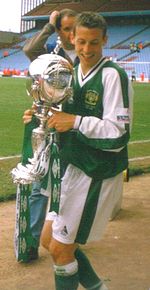Adam Stansfield

Stansfield holding the FA Trophy following Yeovil's victory in 2002
|
|||
| Personal information | |||
|---|---|---|---|
| Full name | Adam Stansfield | ||
| Date of birth | 10 September 1978 | ||
| Place of birth | Plymouth, England | ||
| Date of death | 10 August 2010 (aged 31) | ||
| Place of death | England | ||
| Height | 5 ft 9 in (1.75 m) | ||
| Playing position | Striker | ||
| Youth career | |||
| Cullompton Rangers | |||
| Elmore | |||
| Senior career* | |||
| Years | Team | Apps | (Gls) |
| 2001–2004 | Yeovil Town | 55 | (14) |
| 2004–2006 | Hereford United | 62 | (25) |
| 2006–2010 | Exeter City | 142 | (37) |
| Total | 259 | (76) | |
| National team | |||
| 2002–2005 | England semi-pro | 5 | (1) |
| * Senior club appearances and goals counted for the domestic league only. |
|||
Adam Stansfield (10 September 1978 – 10 August 2010) was an English professional footballer who played as a striker. He competed professionally for Yeovil Town, Hereford United and Exeter City, and won promotion from the Football Conference to The Football League with all three teams.
Having played for three counties as a child, Stansfield began his career in non-league with Cullompton Rangers and Elmore, and had unsuccessful trials at league teams. At the age of 23, he signed his first professional contract with Yeovil Town, after impressing their manager Gary Johnson in a match against them. In his first season, he helped them win the FA Trophy, scoring in the 2002 final. The following season, Yeovil won the Conference and promotion into The Football League, although Stansfield was ruled out with a broken leg in the first game. In 2004, he transferred to Hereford United, where he won promotion to The Football League via the 2006 play-offs, and repeated the feat with Exeter City a year later. He also helped Exeter earn promotion into League One in 2008. At international level, Stansfield played five matches and scored one goal for England's national semi-professional team, winning the 2005 Four Nations Tournament.
Stansfield was diagnosed with colorectal cancer in April 2010. He returned to training after surgery and chemotherapy, but died on 10 August that year. A foundation in his name was posthumously set up by his family to provide sporting opportunities and raise awareness of colorectal cancer. He has posthumously been featured on a Flybe airliner livery and tourist currency in Exeter.
...
Wikipedia
